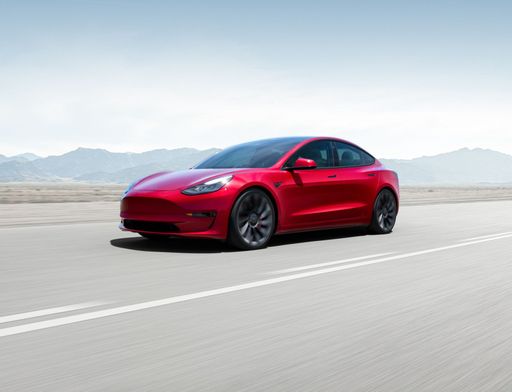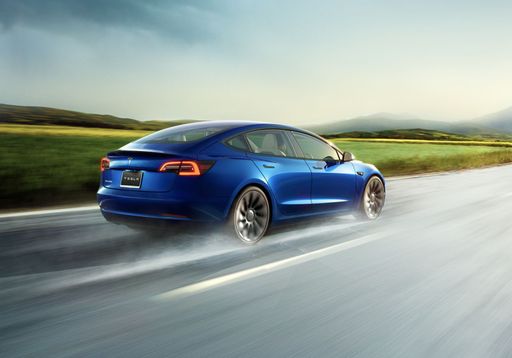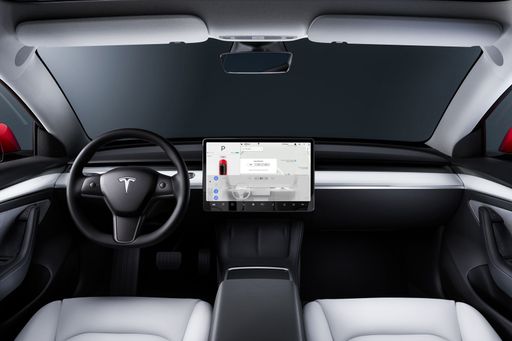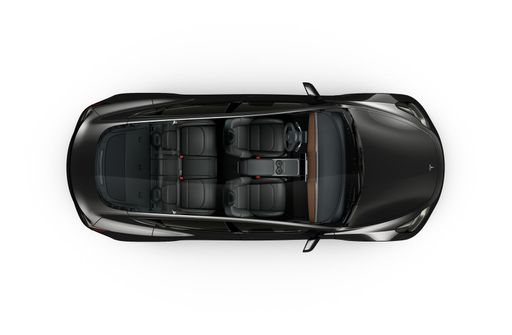Toyota Prius vs Tesla Model 3 - Differences and prices compared
Compare performance (223 HP vs 460 HP), boot space and price (39400 £ vs 31700 £ ) at a glance. Find out which car is the better choice for you – Toyota Prius or Tesla Model 3?
Costs and Efficiency:
Price and efficiency are key factors when choosing a car – and this is often where the real differences emerge.
Tesla Model 3 has a noticeable advantage in terms of price – it starts at 31700 £ , while the Toyota Prius costs 39400 £ . That’s a price difference of around 7715 £.
As for electric range, the Tesla Model 3 performs decisively better – achieving up to 750 km, about 664 km more than the Toyota Prius.
Engine and Performance:
Power, torque and acceleration say a lot about how a car feels on the road. This is where you see which model delivers more driving dynamics.
When it comes to engine power, the Tesla Model 3 has a significantly edge – offering 460 HP compared to 223 HP. That’s roughly 237 HP more horsepower.
In acceleration from 0 to 100 km/h, the Tesla Model 3 is decisively quicker – completing the sprint in 3.10 s, while the Toyota Prius takes 6.80 s. That’s about 3.70 s faster.
In terms of top speed, the Tesla Model 3 performs noticeable better – reaching 262 km/h, while the Toyota Prius tops out at 177 km/h. The difference is around 85 km/h.
Space and Everyday Use:
Cabin size, boot volume and payload all play a role in everyday practicality. Here, comfort and flexibility make the difference.
Both vehicles offer seating for 5 people.
In curb weight, Toyota Prius is hardly perceptible lighter – 1620 kg compared to 1772 kg. The difference is around 152 kg.
In terms of boot space, the Tesla Model 3 offers decisively more room – 594 L compared to 284 L. That’s a difference of about 310 L.
When it comes to payload, Tesla Model 3 minimal takes the win – 377 kg compared to 375 kg. That’s a difference of about 2 kg.
Who wins the race in the data check?
The Tesla Model 3 sits well ahead of its rival in the objective data comparison.
This result only shows which model scores more points on paper – not which of the two cars feels right for you.
Costs and Consumption
View detailed analysis
Engine and Performance
View detailed analysis
Dimensions and Body
View detailed analysis

Tesla Model 3
Toyota Prius
The Prius glides through traffic like a wise commuter's secret weapon, balancing miserly running costs with an unflappable sense of reliability. It's not a thrill seeker, but its roomy cabin, sensible packaging and low-stress driving personality make it a brilliant choice for buyers who value peace of mind over pulse-raising performance.
details



Tesla Model 3
The Tesla Model 3 slices through daily commuting with a silent, confident shove that makes petrolheads reassess their life choices, while its minimalist cabin feels more like a slick gadget gallery than a traditional car interior. For buyers after a fuss-free, tech-forward electric with plenty of grin factor and low running drama, it’s hard to beat—just don't be surprised when the car updates itself overnight.
details



Costs and Consumption |
|
|---|---|
|
Price
39400 - 45800 £
|
Price
31700 - 50100 £
|
|
Consumption L/100km
0.5 - 0.7 L
|
Consumption L/100km
-
|
|
Consumption kWh/100km
-
|
Consumption kWh/100km
13 - 16.7 kWh
|
|
Electric Range
72 - 86 km
|
Electric Range
534 - 750 km
|
|
Battery Capacity
-
|
Battery Capacity
83 kWh
|
|
co2
12 - 17 g/km
|
co2
0 g/km
|
|
Fuel tank capacity
40 L
|
Fuel tank capacity
-
|
Dimensions and Body |
|
|---|---|
|
Body Type
Hatchback
|
Body Type
Sedan
|
|
Seats
5
|
Seats
5
|
|
Doors
5
|
Doors
4
|
|
Curb weight
1620 - 1630 kg
|
Curb weight
1772 - 1929 kg
|
|
Trunk capacity
284 L
|
Trunk capacity
594 L
|
|
Length
4599 mm
|
Length
4724 mm
|
|
Width
1782 mm
|
Width
1850 mm
|
|
Height
1470 mm
|
Height
1431 mm
|
|
Max trunk capacity
-
|
Max trunk capacity
-
|
|
Payload
365 - 375 kg
|
Payload
303 - 377 kg
|
Engine and Performance |
|
|---|---|
|
Engine Type
Plugin Hybrid
|
Engine Type
Electric
|
|
Transmission
Automatic
|
Transmission
Automatic
|
|
Transmission Detail
CVT
|
Transmission Detail
Reduction Gearbox
|
|
Drive Type
Front-Wheel Drive
|
Drive Type
All-Wheel Drive, Rear-Wheel Drive
|
|
Power HP
223 HP
|
Power HP
283 - 460 HP
|
|
Acceleration 0-100km/h
6.80 s
|
Acceleration 0-100km/h
3.1 - 6.2 s
|
|
Max Speed
177 km/h
|
Max Speed
262 km/h
|
|
Torque
-
|
Torque
420 - 660 Nm
|
|
Number of Cylinders
4
|
Number of Cylinders
-
|
|
Power kW
164 kW
|
Power kW
208 - 338 kW
|
|
Engine capacity
1998 cm3
|
Engine capacity
-
|
General |
|
|---|---|
|
Model Year
2023
|
Model Year
2025
|
|
CO2 Efficiency Class
B
|
CO2 Efficiency Class
A
|
|
Brand
Toyota
|
Brand
Tesla
|
Is the Toyota Prius offered with different drivetrains?
Available configurations include Front-Wheel Drive.
